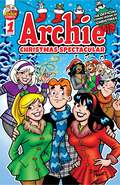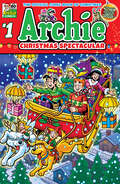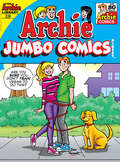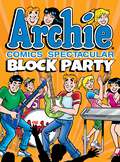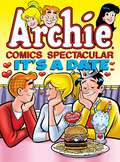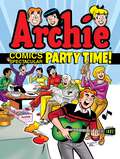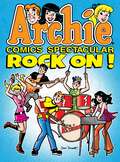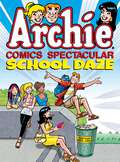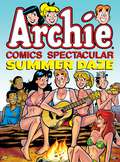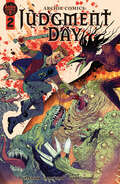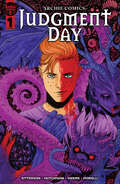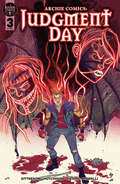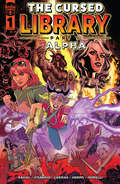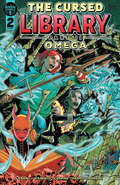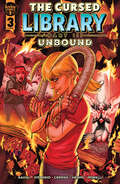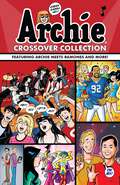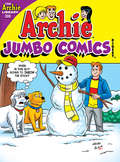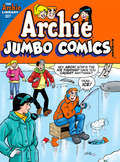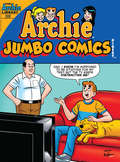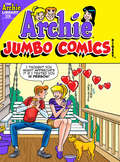- Table View
- List View
Archie Christmas Spectacular (Archie's Christmas Spectacular #1)
by Archie SuperstarsWe’re celebrating Christmas with a BRAND-NEW story to kick off this collection of festive tales! In “Christmas Pie Guy,” our story begins as an irate Miz Beazley, who’s just had one of her famous Christmas pies stolen! The thief? Beazly believes it to be Jughead and wants to make sure he pays. Seeing her rage, Mr. Svenson tries to spark the Christmas spirit back in his friend—but can it be done?
Archie Christmas Spectacular (Archie's Christmas Spectacular #1)
by Archie SuperstarsBRAND NEW STORY: Amber Nightstone—Sabrina’s fiercest magical rival—is on a mission: get Sabrina the best Christmas gift ever?!
Archie Christmas Spectacular (Archie's Christmas Spectacular)
by Archie SuperstarsBRAND NEW STORY: “Christmas Chaos!” Christmas goes from nice to naughty for Archie and his friends when Jingles and Sugarplum are replaced by their bizzarro counterparts Jangles and Sourplum and a cranky ol’ version of Santa called Grumpus! All that plus more holiday hijinks!
Archie Comics Double Digest #339 (Archie Double Digest #339)
by Archie SuperstarsTWO BRAND NEW STORIES! First, in “Chain of Command,” Pureheart the Powerful teams up with the Crusaders! But will their powers combined be a match for Bronto, a humanoid rock monster bent on destruction? Next, in “Mother’s Little Helper,” the hero She-Fox arrives in Riverdale on an important mission: to drive her son Shinji to school! But when terror strikes in the form of a dinosaur supervillain, will She-Fox need some help to take down the t-rex tyrant?
Archie Comics Double Digest #340 (Archie Double Digest #340)
by Archie SuperstarsTWO BRAND NEW STORIES! First, in “Power Pet Peeves,” the Superteens get word that a handful of supervillains are loose in Riverdale. As the team goes to stop these villains, the Power Pets tag along unnoticed. But when our teen superheroes come face-to-face with a villainous bank robber, the Power Pets leap into action! Then, in ”Penny Makes Sense!” Intrepid investigator Penny Parker is on an important case: find Archie’s missing book report! Hey, in Riverdale, anything can be exciting!
Archie Comics Spectacular: Block Party (Archie Comics Spectaculars #8)
by Archie SuperstarsARCHIE COMICS SPECTACULAR: BLOCK PARTY collects 128 pages of hand-picked, favorite party and celebration-themed stories about Archie, Jughead, Betty, Veronica and friends.
Archie Comics Spectacular: Food Fight! (Archie Comics Spectaculars #6)
by Archie SuperstarsFOOD FIGHT! Get ready for an all-out food war with Archie, Jughead, Reggie, Betty & Veronica as they take lunch to the next level in this spectacular collection of sweet and savory stories! When the lunch bell rings, will Jughead be forced to tap out to the soup of the day or does he have the stomach to take down the main course?
Archie Comics Spectacular: Friends Forever (Archie Comics Spectaculars #7)
by Archie SuperstarsARCHIE COMICS SPECTACULAR: FRIENDS FOREVER! collects 128 pages of hand-picked, favorite friendship and friendly rivalry-themed stories about Archie, Jughead, Betty, Veronica and friends.
Archie Comics Spectacular: It's a Date (Archie Comics Spectaculars)
by Archie SuperstarsIt's hilarious high school dating hi-jinx in a great pocket-sized edition from Archie Comics! This graphic novel collection features hand-picked, favorite stories about the comedically dysfunctional dating scene of friends Archie, Betty and Veronica at Riverdale High.
Archie Comics Spectacular: Party Time! (Archie Comics Spectaculars #5)
by Archie SuperstarsLET&’S PARTY! Get down with Archie, Jughead, Betty & Veronica! Join Archie and the gang as they dance all night and party all day. Everyone loves to have a good time, and the teens of Riverdale are no exception! So what are you waiting for? Turn this book over and let the party begin!
Archie Comics Spectacular: Rock On! (Archie Comics Spectaculars #6)
by Archie SuperstarsARCHIE COMICS SPECTACULAR: ROCK ON! collects 128 pages of hand-picked, favorite music-themed stories about Archie, Jughead, Betty, Veronica and friends.
Archie Comics Spectacular: School Daze (Archie Comics Spectaculars)
by Archie SuperstarsCheck out all your favorites--Archie, Betty Veronica, Reggie, Jughead, and more at Riverdale high. Can Archie balance his two-pronged love life and keep his grades up, all under the watchful eye of Principal Weatherbee? Will Reggie be able to continue his chaotic pranks without spending every day in detention? Can Jughead indulge his bottomless appetite when Ms. Beazley's cafeteria food is so...unique? It's high school fun in a great pocket-size edition!
Archie Comics Spectacular: Sports Time (Archie Comics Spectaculars #3)
by Archie SuperstarsIt's Sports Time at Riverdale High, and that can mean only one thing—slapstick cartoon sports comedy galore featuring Archie, Betty, Veronica, Jughead and friends. All in a great pocket-size edition!
Archie Comics Spectacular: Summer Daze (Archie Comics Spectaculars #4)
by Archie SuperstarsSchool's out for the summer in Riverdale, and the fun is just beginning! Join Archie, Betty, Veronica, Jughead and friends as they go on vacation, go to the beach, work summer jobs. . . and avoid working entirely! All in a pocket-sized collection that's perfect for any summer road trip.
Archie Comics: Judgement Day #2 (Archie Horror Presents #2)
by Aubrey SittersonThe epic Archie Horror event continues, as does Archie’s quest. Jughead’s trying his best to act as Archie’s conscience and voice of reason, but with so many people once familiar and even beloved to Archie turning into demonic monstrosities, can Archie maintain his grip? Maybe if Jughead gets more people on his side, they can talk some sense into him—are Betty and Veronica up to the task of bringing back the Archie they know and love from Alistair’s grasp?
Archie Comics: Judgment Day #1 (Archie Horror Presents #1)
by Aubrey SittersonIn a world overrun with demons, Archie Andrews is on a quest to cleanse Riverdale of all wicked-kind. Harnessing the destructive power of a captive fiend, he will have to destroy corrupted and possessed versions of the people closest to him. Questioning his own morality and forced to make difficult sacrifices, are Archie’s efforts truly good, or the work of pure evil? Traverse the most horrifying version of Riverdale yet in the first Archie Premium Event.
Archie Comics: Judgment Day #3 (Archie Horror Presents #3)
by Aubrey SittersonThe epic horror event of the summer comes to its shocking end! At Jughead’s insistence, Archie is willing to make amends with someone important to him—but what he discovers will force him to make a choice that could change his life. It’s finally time for Archie to decide—will he give himself over fully to Alistair, or retain the parts of himself that make him Archie? Find out in this jaw-dropping conclusion that will have readers talking for years to come.
Archie Comics: The Cursed Library #1: Alpha (Archie Horror Presents #1)
by Eliot RahalThis is it… this is the moment our horror one-shots have led to… THE CURSED LIBRARY! When we last left off in MADAM SATAN: HELL ON EARTH, Jinx has the former Queen of the Underworld trapped in the mysterious library, as her father-bestowed demon powers have intensified. To stop Jinx from becoming like her father, her best friend Danni Malloy must rescue and convince Madam Satan to guide her through Hell itself to find the one thing that can possibly save her friend’s soul––Jinx’s mom. Along the way, they’ll also discover a number of faces they’ve seen before, though only in the pages of the terrifying tomes within the cursed library. This three-issue limited series horror event tells a story about the bonds that tie us together and how the only thing that can save the world from evil is radical love. It’s Riverdale’s Return of the Jedi meets Dante’s Inferno. A three-part event that will close the door on the Cursed Library and usher in a whole new chapter of horror stories.
Archie Comics: The Cursed Library #2: Omega (Archie Horror Presents #1)
by Eliot RahalThe next thrilling chapter of the Cursed Library saga is here! In ALPHA, Danni and Jinx confronted Lucifer himself—over what was supposed to be a family dinner. But the devil can’t be so easily tricked, and while Jinx is separated from her best friend Danni and transported to an uncanny valley version of her life, Madam Satan faces imprisonment. It’s going to take a journey through the depths of Hell to right all that has been wronged! And who they find there may just surprise you!
Archie Comics: The Cursed Library #3: Unbound (Archie Horror Presents #3)
by Eliot RahalThis is it! The final chapter of the Cursed Library is here. Will Jinx assume her rightful role on Satan’s throne? Can the unlikely duo of Danni and Madam Satan save her? It’s going to take a hell of a lot to set things right!
Archie Crossover Collection
by Alex Segura Matthew RosenbergGet ready for this star-studded event as icons from music, film and sports visit Riverdale! From The Ramones to Michael Strahan, you'll be star-struck reading this special collection!Hey! Ho! Let's go! America's favorite teens cross paths with the original NYC punks as part of spectacular collection that is not to be missed!When the Archies tank at the Riverdale High Battle of the Bands, a magical twist of fate sends them hurtling into the past--and face-to-face with none other than the Ramones! Can the legendary punks get the Archies to realize their own rock 'n' roll potential and find their way home? Probably not--but it'll be a blitzkrieg bop of a journey, as the two bands bounce from 53rd and 3rd to Rockaway Beach in this must-read crossover from the writers of the best-selling ARCHIE MEETS KISS and WE CAN NEVER GO HOME with jaw-droppingly beautiful art from Gisele Lagace ("Occupy Riverdale")!Plus more featuring guest stars like Michael Strahan, Lady Gaga, George Takei and many more!
Archie Double Digest #306 (Archie Double Digest #306)
by Archie SuperstarsBRAND NEW STORY: “The Dating Analysis” Dilton wonders why Archie is so successful with girls, so he asks Archie if he can tag along on a few of his dates to gain a better understanding of romance—but will Dilton’s research yield great results, or will Dilton actually know much more about dating than Archie does?
Archie Double Digest #307 (Archie Double Digest #307)
by Archie SuperstarsBRAND NEW STORY: “Cup of Copy” Archie is appointed with a very important task from Mr. Weatherbee. It seems simple enough—but with Archie in charge, things are certain to go awry!
Archie Double Digest #308 (Archie Double Digest #308)
by Archie SuperstarsBRAND NEW STORY: “Garage Barrage!” Archie and his dad have an important mission to complete: cleaning the garage! Will they get the job done in time or will memories and nostalgia get the best of them?
Archie Double Digest #309 (Archie Double Digest #309)
by Archie SuperstarsBRAND NEW STORY: “Dogging the Cat Burglar!” Archie is dog-sitting his best friend Jughead’s beloved pooch Hot Dog. Will Hot Dog and Vegas become a dynamic doggy duo? Find out when these two are put to the ultimate test in canine loyalty!

